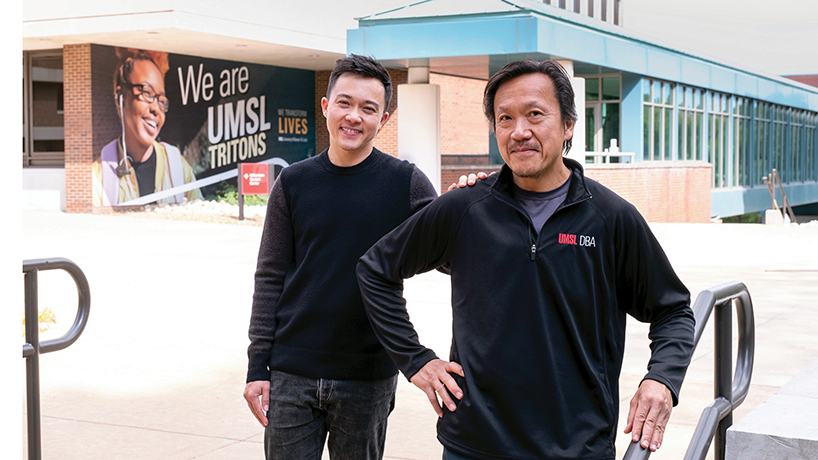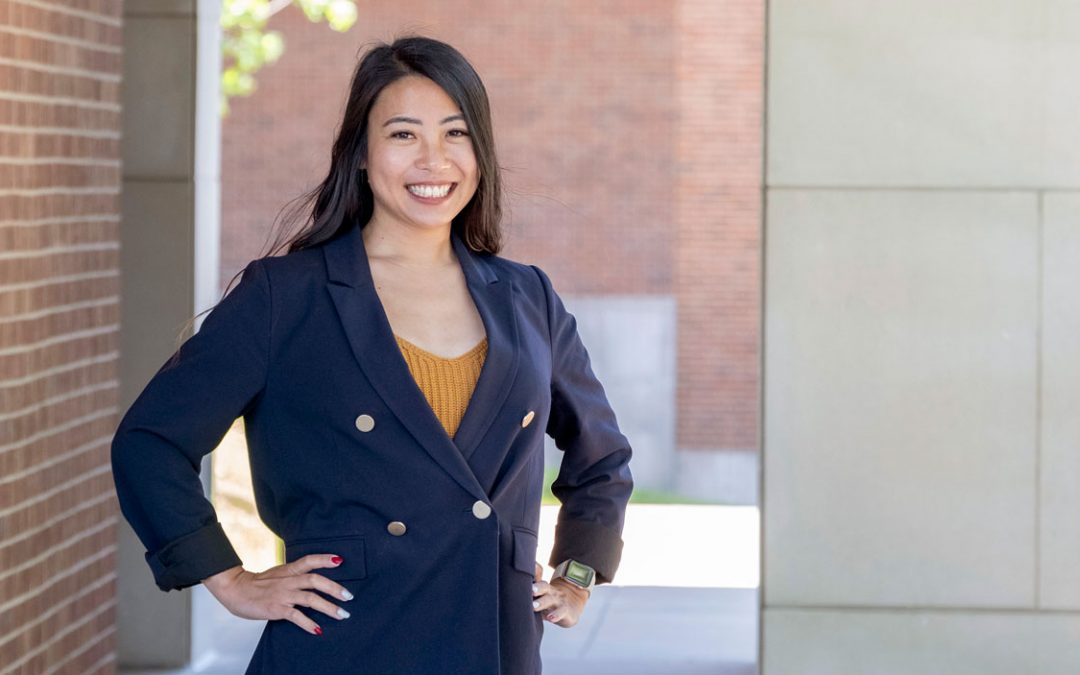
Despite differences in their career paths and stages, father and son Kei Pang (right) and Jo Pang (left) both found academic homes in the UMSL Doctor of Business Administration program. (Photo by August Jennewein)
Kei Pang was at the apex of his career in 2018.
He’d served as chief executive officer of the multibillion-dollar electric motor manufacturer Nidec Motor Company since 2013. Prior to that, he’d earned a BS in materials engineering from the University of London then his MBA from the University of Michigan before rising through the ranks at Emerson Electric Company and Nidec, holding august titles such as president, chief operating officer and vice chairman along the way.
So deciding to head back to school – that was a move seemingly out of nowhere.
Kei enrolled in the Doctor of Business Administration program at the University of Missouri–St. Louis at the urging of a friend – Charles Hoffman, dean emeritus of the College of Business Administration.
“I’m here for the learning aspect of it,” Kei says. “I look forward to getting away from my day-to-day routine and going into an intellectual, academic learning environment where people collaborate and help each other. It’s a learning and sharing experience.”
Poised to graduate the program as a member of the debut cohort, he’s part of a storied moment in DBA program history. But even after he wraps up his dissertation, he’ll be leaving the program a different kind of legacy: his son, Jo Pang, an organizational consultant and mindfulness teacher who recently founded his own consulting company, Culture Wise. He began courses this semester as part of the program’s fourth cohort.
That two generations of Pangs found an intellectual home in the DBA program speaks to its broad appeal and versatility.
“The DBA program offers a unique opportunity for accomplished business professionals to transform their business and industry through engaged management scholarship,” says Ekin Pellegrini, founding director. “The curriculum equips practitioners with the knowledge and the tools to inform business problems through scholarly research. In essence, they learn to marry rigor with relevance.”
The terminal business degree is tailor-made for lifelong learners who want to continue their educations beyond an MBA. While PhD programs focus on answering theoretical questions, DBA students research answers to real-world problems that impact businesses’ daily operations, crossing lines between disciplines in order to find solutions.
The DBA, which is Missouri’s only Association to Advance Collegiate Schools of Business accredited program of its type, has been rated highly since its inception. But that’s not what appeals most to Kei and Jo.
“The professors can rival anyone I’ve met at private universities,” says Kei, who is also a member of the UMSL Chancellor’s Council. “They’re more patient and more attentive to individuals’ needs. That’s why I encouraged Jo to apply to the program. You may not get the brand name, but from a learning experience, you get more.”
Though students typically have 10 to 20 years of management experience, the program design appeals to businesspeople in a range of career phases. For Kei, pursuing a DBA provides a transition between working and retirement while giving space for self-examination and potentially a more meaningful post- retirement vocation. When he decided to step back from his role as the CEO of Nidec, he’d sought a new outlet for his business drive.
His resulting dissertation focuses on how private equity firms differentiate themselves in creating value for investors. One of the surprises for Kei has been the value he’s gained from honing and expanding his communication and research skills from typical business bullet points to the in-depth analysis demanded in academia.
“In business, there’s more of a disconnect between practitioners and academia than other professions,” Kei says. “But you really benefit from the time and money you invest in the program. The challenge is writing the dissertation. It’s a little less structured than coursework, so you have to basically find your own way.”
Jo, who previously earned his master’s in information systems at UMSL, discovered an interest in improving organizational culture and promoting inclusion as his career progressed.
“I was working in places where I realized the biggest hindrance was not necessarily technology or process but the culture,” he says. “They could change the technology. They could implement a new multimillion-dollar platform, but some of the roots of their biggest dysfunctions and hindrances were in the people. The people part is so often the least understood, the most mysterious and also the least regarded, and my interest has been to go right for that.”
He plans to use the DBA program as an opportunity to gain a deeper understanding of organizational behavior and culture in order to help purpose-driven companies.
His emphasis on improving organizational culture through effective leadership goes hand-in-hand with his passion for social justice. He focuses on mindfulness and how companies can assist employees on becoming more aware, personally and socially, which ultimately makes an organization more impactful and better able to serve a multicultural customer base.
“A lot of organizational practices were made up in the industrial age for machine factory line scenarios and don’t bring out people’s most creative, authentic parts of themselves,” Jo says. “It seems like a very big disservice. I help leaders and clients diagnose and understand their culture and unblock certain things that they might be doing that are contributing to not having the culture that would most effectively serve the organization’s vision.”
As Jo begins classes, Kei doesn’t anticipate any competitiveness between them in terms of research productivity. Instead, they share a deep sense of curiosity and are eager to learn from instructors and classmates as well as bridge the divide between practice and academics.
Kei is inspired by his son’s determination to help improve society.
“In the past decade, I have begun to embrace more of an ecocentric view,” Kei says. “That means caring for and valuing humans of all creeds and nationalities as well as all living creatures on the planet. Having gratitude for all creation and doing all I can to support this recently developed awareness is where a lot of my fulfillment comes from.
“My son has a very strong focus. He’s spent a lot of time to find himself through music, writing, contemplative practices and building community. It’s problematic that some leaders today support divisiveness, and the ‘us versus them’ mentality has led to great imbalances. Thankfully there are young people coming up through the ranks who have better awareness and intuition that can help lead the way to greater compassion, respect and harmony for all those who share the earth.”
This story was originally published in the fall 2020 issue of UMSL Magazine. If you have a story idea for UMSL Magazine, email magazine@umsl.edu.














